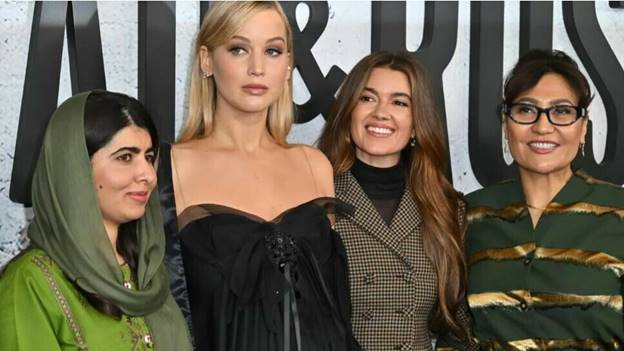

The documentary follows three women living under the Taliban regime
Malala Yousafzai & Jennifer Lawrence Highlight Plight of Afghan Women with Documentary Bread and Roses
Nobel laureate Malala Yousafzai said she was shaken by the fact that people stand with survivors but don’t look at those who remain under threat, questioning if everything was about receiving awards or creating systems of accountability and justice.
Yousafzai’s comment came during an interview with CBS Mornings, where the activist sat with Hollywood actor Jennifer Lawrence and Afghan filmmaker Sahra Mani while they spoke about their documentary Bread and Roses. Directed and produced by Mani, executive produced by Yousafzai and produced by Lawrence, the documentary features footage shot by three Afghan women living under the Taliban regime.
Mani said, “Women in Afghanistan are not allowed to go to work, to get an education, to go on the street without a chaperone, to sing, play music. They are not allowed to make films or go to the restaurant and buy food.”
Lawrence added that her first reaction to the situation in Afghanistan was to do what the Taliban did not want and give access and facilities to the people on the ground to capture their lived realities in real-time. “Because obviously, the Taliban flourish in secrecy.”
Yousafzai highlighted that Afghan women were calling it gender apartheid because they were oppressed because of their gender.
“We have been trying to figure out an answer [to why Taliban don’t want women to get education] for 30 years. The Taliban took over in 1996 and they have had influence in many parts of Afghanistan and parts of Pakistan, and this is not repeating in Afghanistan once again where the Taliban have had control for more than three and a half years.”
The Nobel Peace Prize winner added that she couldn’t find any explanation that justified preventing girls from receiving an education. She said that the Taliban often gave religious or cultural excuses, however, the true representatives of the culture were the Afghan women and girls in the documentary.
Mani explained that she wanted to capture the intimate moments of Afghan women’s lives under Taliban rule and was encouraged by their fight for betterment. She said she was inspired by Yousafzai’s 2013 speech at the UN where she said, “One child, one teacher, one pen, and one book can change the world”.
“I thought to myself, one movie, one camera, one director can also bring change to their own society. That really encouraged and inspired me to take out my camera, go out and find stories, and I think that was the reason these women trusted me with their stories and started sending their videos.”
Lawrence said she could not imagine living in a world where she could not speak in public nor be able to take a taxi or listen to music. “I can’t imagine if just the sound of my voice was illegal.”
The Oscar-winning actor added that initially her friends and family cautioned her not to get involved with the matter because of potential dangers, however, “there’s 20 million women whose lives are in danger”.
She said she received some criticism from netizens for trying to talk about politics despite dropping out of middle school. However, Lawrence believed the matter was not political.
“It’s political in the sense that you should push your congresspeople and you should get involved to make our government more accountable and then the UN can recognize the gender apartheid. But I don’t find it political and I’m educated in filmmaking and telling stories.”
Yousafzai said the women in the documentary were speaking on behalf of 20 million Afghan women and girls. “Three women have risked their lives but these are not the only voices, we need to think of all the millions of Afghan women and girls who need our attention and support. Let’s share our solidarity with them.” - Images

